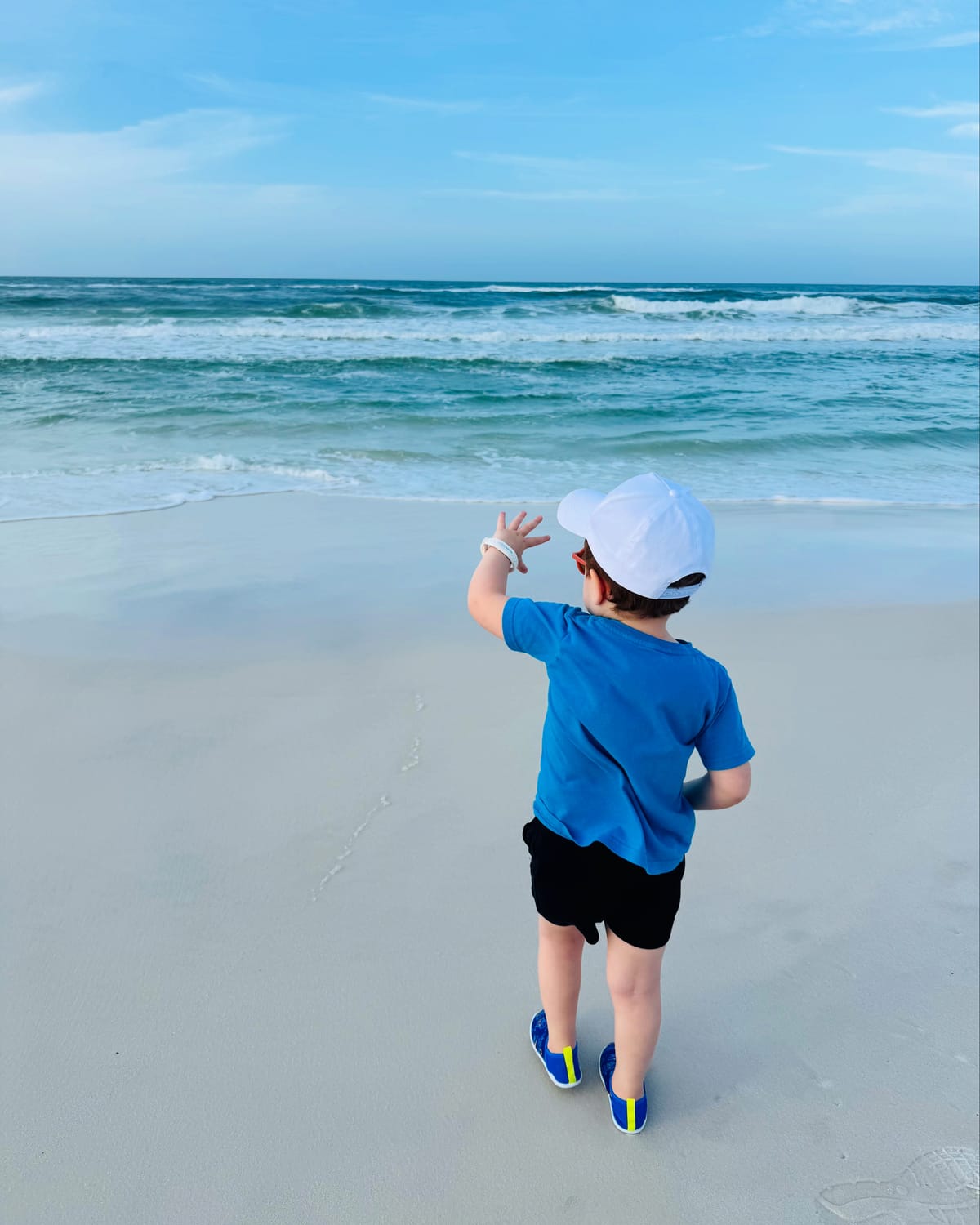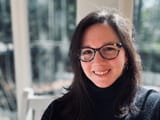This is why I am afraid to die.

My son will turn 4 years old next week. If I close my eyes, I am only a moment away from all of the sights, sounds, textures, tastes, and smells of newborn life. The sight of blooms in our Dogwood tree, the smell of a (clean) Pamper's size one diaper, the sound of the mechanical hiss of a breast pump, the taste of peanut butter protein bars, and the texture of a muslin swaddle bring me right back to late April of 2021. Just over a month after he was born, my mom became critically ill as we discovered her stage III cancer diagnosis. I had five weeks of blissful (in spirit, not in body - postpartum recovery was one of the hardest experiences of my life) new motherhood before I was violently thrown into a world of facing the possibility of becoming a mother without mine. In hindsight, I was bewildered by love. Entirely overwhelmed. My mom has since recovered and I am grateful she has four years of being "Lovie" to my son.
When I think back to the newborn days, I can remember practically feeling a physical connection form between Addison and me, even though he had long since lost the umbilical cord actually keeping us together. Actually, it felt like a physical net was forming, connecting me to Addison and Christopher, knitting us together. Blest be the tie that binds.
This isn't why I'm afraid to die.
Don't get me wrong: motherhood opened a floodgate of new experiences and emotions, and certainly kicked up my desire to live as long as possible. I constantly balance mourning his outgrown clothes with feeling excited to see where he is going next. I measure my life in toddler shoe sizes.
About two years ago, I remember thinking how I want to see and experience every moment of this child's life as I am able; I want to raise him to be a healthy, well-adjusted, thoughtful, mindful, kind, successful citizen of the world, and hope he enjoys a long life of deep love, friends, family, passions, adventures, community, connection, safety and stability. This became my ongoing hope and prayer.
And over the past two years, I've continually seen ways in which Addison is not a typical child. He had awful ear infections (and even failed a hearing test), so he had tubes placed just before his second birthday. During the first teacher conference of his five-day two's preschool class, which was two days after his 36 month doctor's appointment, both our preschool director and pediatrician said the same thing: Addison has a speech delay. No problem, we thought. He couldn't hear for a long time and speech delays are common. We live right around the corner from an amazing pediatric therapy clinic. One of his aunts is a speech-language pathologist, and one of our good friends is one as well. We'd be covered, he'd be fine.
Speech begins and progress is made, slowly. About six months into speech therapy, his SLP recommended occupational therapy. Addison is motivated by movement - when he's moving, he's talking – so all of this made sense.
We had two more teacher conferences during his two's and Pre-K 3's class, where we came to a) dread them, because we kept hearing about ways Addison is falling behind in his social/peer development, and b) be incredibly grateful for them, because of the love and care he receives at his preschool. In November 2024, during our winter conference, his teacher asked a question.
"Has Addison ever seen a developmental pediatrician?"
He had not - because it hadn't really crossed our radar. Sure, I assumed he'll probably have ADHD due to genetics alone, but he's also three years old. We knew he had a receptive and expressive speech delay, but that was old news we were managing well with early intervention. He was screened at some point during his speech intake for developmental disabilities, with no remarkable findings.
But this meeting was heavy. With kindness and compassion, we also heard something we dreaded to process: if things continue as they are now, without additional support, he's going to have a very difficult time in preschool.
Christopher and I are equal-partner parents. Both of us know everything he's up to. We share responsibility for managing appointments and knowing clothing sizes and what he's had to eat that day. We are his sole primary caregivers outside of the hours he's at preschool. But Addison does have a secret world - one we don't get to see in a day-to-day classroom. And this world was telling us he's struggling.
A month later, on December 10, we had an appointment on the books for a developmental pediatrician, one of the only ones in Atlanta covered by our insurance (thanks entirely to one of my best friends who works in the industry). After a three-hour assessment, we learned Addison has Autism Spectrum Disorder, Level 2, requiring substantial support.
This is why I'm afraid to die.
Let me be very clear: I am not afraid to die because Addison is autistic. Autism is an aspect of my son's humanity, and Addison did not suddenly stop being Addison on December 10. In fact, I'm realizing so many things I love about Addison are connected to his autism. The NIH definition of autism is "is a neurological and developmental disorder that affects how people interact with others, communicate, learn, and behave." I much prefer Keri Opai's addition to the Māori (indigenous people of Aotearoa/New Zealand) language of the definition of autism: takiwatanga, or "in their own time and space."
Addison is 100% in his own time and space. He's a wonder to behold. He has remarkable patience and tenacity to pursue whatever it is that is interesting to him (often figuring out how to open locks and doors). I wish you could see the joy on his face when I play music he loves (at the time of this writing, it's the main title/fight song from Monster's University). He absolutely loves being outside; I've watched him meander around our yard, fully absorbed in tracing his fingers along the bark of a pine tree. He's witty, silly, smart, and a little bit mischievous.
I'm not afraid to die because Addison has autism. I'm afraid to die because I'm afraid of leaving my son behind in a world that diminishes and despises his humanity.
You've likely seen (unless you're actively avoiding) the U.S. Department of Health and Human Services Secretary's recent proclamation to "find the cause of autism by September.....we will know what has caused the Autism epidemic and we’ll be able to eliminate those exposures." As if autism were a contagious disease to be eliminated; a public health crisis instead of a developmental disability. This, of course, is on brand with his continual effort to (wrongfully) claim childhood vaccines cause developmental disabilities. Vaccines do not cause autism. I'm not here to debate or defend that; it's a fact.
Instead, I want unpack some of the conversation around the "autism epidemic." I often wonder why folks like RFK Jr. and others like him are so pressed to find a connection to autism and vaccines, or autism and environmental factors. With regard to the current administration, I have a very hard time believing it's because they care deeply about the lives of children and adults with developmental disabilities (eleven states, including the state we live in, joined a lawsuit claiming Section 504 of the Rehabilitation Act of 1973 is unconstitutional. Section 504 defines disability, promotes equal opportunity for individuals with disabilities, and prohibits discrimination on the basis of education in any place that receives federal funding, such as public schools and hospitals).
Why does RFK Jr. want to "find the cause of autism" in the next five months? There's a logic model here that makes me sick at my stomach. Find a cause, eliminate the cause, eliminate autism. Eliminate people. And why eliminate these people? Because they're not typical. They won't produce the way a capitalist society demands. They benefit from community-based support we are not willing to fund. They cost money. They threaten the way we've built society.
If you're still reading, and you had a moment of thinking "gosh, I feel so bad for Mary Chase and Chris, Addison has autism" – I like to think it's because you love us (and we are so lucky you do), and because you know there challenges ahead. I just want to be very clear: Addison having autism is not bad, and it's not something that should make you feel bad or sad. Feel bad that we live in a world where you feel bad that our son has autism in it.
If you (a more general "you" here) view developmental disabilities as diseases to be cured or a conditions to be eliminated, you diminish the sanctity of human life. If you think autism is an epidemic and if we could just get rid of Cheese-Its, we'll have a world without autism, you're reinforcing some dangerous ideology.
Individuals with disabilities have always existed. Throughout history, we've seen empires and regimes attempt to eliminate disabled individuals entirely, and to keep them invisible in society. The current administration just eliminated the Administration for Community Living, the office that helped older adults and individuals with disabilities live in safety in community.
I feel so lucky to have community. We are connected to wonderful family, friends, and the parish life at our church. There are a lot of people in my life who love Addison, and that love and hope sustains me as I think about the future. But the fear is ever-present. My own death anxiety has increased substantially since December 10. In addition to my personal work with a conscious dying coach, I've spent a lot of time thinking about the very specific death anxiety that parents of children with developmental disabilities inevitably feel. Kate Swenson, Adrian Wood, and Carrie Cariello put words to it perfectly in their new book Autism Out Loud.
When the vice grip of anxiety has me by the throat, I spend most of those agonizing (usually middle-of-the-night) moments thinking about how can I balance protecting and promoting my son's humanity while trying to prepare him to live in a world that is not made for him. That's why I'm afraid do die.
I'm terrified to die and leave my son behind in a world that thinks he's a disease to be eliminated.
April is World Autism Month, and autism is our world, because Addison is our world. There is no Addison without autism.



